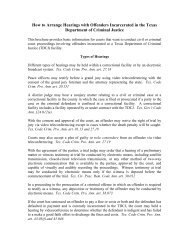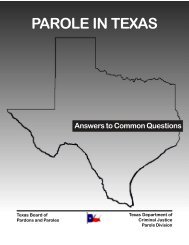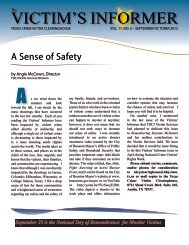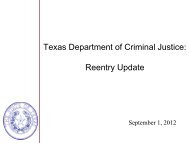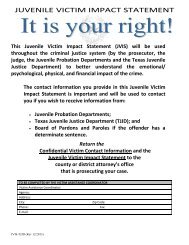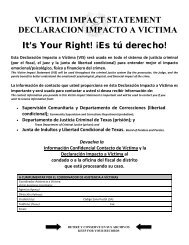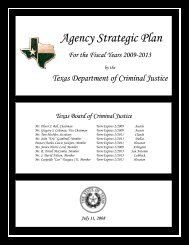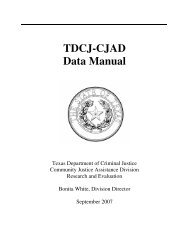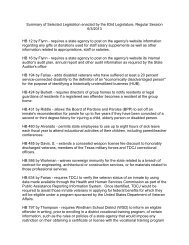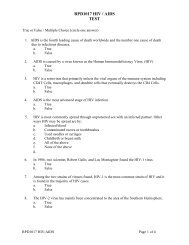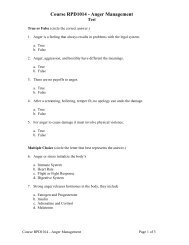Parole in Texas handbook - Texas Department of Criminal Justice
Parole in Texas handbook - Texas Department of Criminal Justice
Parole in Texas handbook - Texas Department of Criminal Justice
You also want an ePaper? Increase the reach of your titles
YUMPU automatically turns print PDFs into web optimized ePapers that Google loves.
a warrant entered <strong>in</strong> the National Crime Information Center (NCIC) upon request from the<br />
receiv<strong>in</strong>g state if the <strong>of</strong>fender receives a new felony conviction; is a violent <strong>of</strong>fender who<br />
commits a significant violation; or is convicted <strong>of</strong> a violent crime. An <strong>of</strong>fender who<br />
absconds supervision must also be retaken by NCIC warrant. Retak<strong>in</strong>g is also required if<br />
an <strong>of</strong>fender commits 3 significant violations <strong>in</strong> the receiv<strong>in</strong>g state; however, for <strong>of</strong>fenders<br />
who commit 3 significant violations, the send<strong>in</strong>g state shall order the return <strong>of</strong> an <strong>of</strong>fender<br />
or retake. If the <strong>of</strong>fender does not return as ordered, the send<strong>in</strong>g state is required to issue<br />
an NCIC warrant to retake the <strong>of</strong>fender. The decision <strong>of</strong> whether a violation is significant is<br />
determ<strong>in</strong>ed by the receiv<strong>in</strong>g state and is a violation that if committed by an <strong>of</strong>fender who<br />
was sentenced <strong>in</strong> the receiv<strong>in</strong>g state would result <strong>in</strong> a request for revocation <strong>of</strong> supervision.<br />
Retak<strong>in</strong>g is the process used to remove a transferred <strong>of</strong>fender from a receiv<strong>in</strong>g state.<br />
Offenders transferred under the Interstate Compact waive extradition which is the process<br />
used to return a fugitive to a state by order <strong>of</strong> the governor. A governor’s order is not<br />
required to return an <strong>of</strong>fender whose supervision has been transferred to another state<br />
under the Interstate Compact.<br />
The process<strong>in</strong>g <strong>of</strong> Interstate Compact transfer requests may take several months, s<strong>in</strong>ce a<br />
parole plan must be <strong>in</strong>vestigated and accepted by the receiv<strong>in</strong>g state. States have 45 days<br />
to reply to a transfer request once the request is received <strong>in</strong> the receiv<strong>in</strong>g state’s compact<br />
<strong>of</strong>fice; however, the amount <strong>of</strong> time needed to f<strong>in</strong>alize an <strong>in</strong>terstate transfer tends to vary<br />
widely. Offenders should file timely requests for out-<strong>of</strong>-state placements and should be<br />
aware that they may encounter unanticipated delays. An <strong>in</strong>carcerated <strong>of</strong>fender seek<strong>in</strong>g to<br />
be supervised by another state after release should contact his Institutional parole <strong>of</strong>ficer.<br />
The IPO <strong>in</strong>itiates the Interstate transfer process by hav<strong>in</strong>g the <strong>of</strong>fender execute an “Offender<br />
Application for Interstate Transfer”. A transfer request for a parol<strong>in</strong>g <strong>of</strong>fender may not be<br />
submitted to the receiv<strong>in</strong>g state any earlier than 120 days prior to the <strong>of</strong>fender’s planned<br />
release date. An <strong>of</strong>fender who has been paroled should contact his supervis<strong>in</strong>g parole<br />
<strong>of</strong>ficer to <strong>in</strong>itiate the transfer request. No <strong>of</strong>fender has a right to Interstate transfer.<br />
What is <strong>Parole</strong> <strong>in</strong> Absentia (PIA)<br />
Some <strong>of</strong>fenders serve their <strong>Texas</strong> sentences while <strong>in</strong> the custody <strong>of</strong> federal facilities, prisons<br />
<strong>in</strong> other states, or city and county jails. The parole panel may conduct parole <strong>in</strong> absentia<br />
reviews for such parole-eligible <strong>of</strong>fenders who are <strong>in</strong>carcerated <strong>in</strong> non-TDCJ facilities. The<br />
<strong>in</strong>stitutional parole <strong>of</strong>fices assist <strong>in</strong> track<strong>in</strong>g PIA reviews and <strong>in</strong> prepar<strong>in</strong>g the appropriate<br />
paperwork.<br />
What happens if <strong>of</strong>fenders violate the terms <strong>of</strong> release<br />
For m<strong>in</strong>or adm<strong>in</strong>istrative rule violations, the <strong>Parole</strong> Division may, at its discretion, decide to<br />
hold a conference with the <strong>of</strong>fender or impose a low-level sanction such as writ<strong>in</strong>g a letter<br />
<strong>of</strong> reprimand. However, any <strong>of</strong>fender who is alleged to have committed a new <strong>of</strong>fense,<br />
absconded from supervision, or violated any rules, terms, or conditions may have a warrant<br />
issued for his or her arrest. Such warrants, which are sometimes referred to as “blue<br />
warrants,” will be executed by law enforcement authorities.<br />
69





